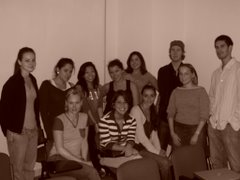By Shira Strassman
For most people, the name Mussolini means fascism, not film. Yet history reveals that beneath the surface of the vile dictatorship lies the true origin of great Italian film production. The RomeFilmFest will reveal some of these early milestones in a tribute to Rome’s biggest empire in recent history: its one-time reign at the top of world cinema.
It was Mussolini’s son, Romano, who inspired a new wave in Italian cinema and the eventual construction of the Cinnecità Studios in Rome, according to Peter Sarram, professor of Italian film at John Cabot University.
The pinnacle of Rome’s initial success in the film industry came with the post-World-War-II birth of Neo-realism. It was a movement that brought street life to the big screen. “It transformed world cinema,” Sarram said. Directors like Federico Fellini ("La Dolce Vita"), Nanni Moretti ("Caro Diario"), and Vittorio De Sica (";Ladri di Biciclette") made their marks by portraying reality itself as a spectacle to be seen and moreover, to entertain. Ancient Roman monuments served as the backdrop of classics like Fellini’s 1960’s film, "La Dolce Vita";, which has since brought more attention to the Trevi Fountain than any tourist brochure ever could.
“It’s a big moral parable,” said Sarram of La Dolce Vita. “The contrast between history and nightlife…is perfect. It’s where the fall of the Roman Empire meets decadence, meets lewd behavior, meets modernity.” And in 2006, capturing modernity is exactly what the Festival aims to achieve. The “Eternal City” will transcend the boundaries of time and culture once again, this time by bridging the roots of great Italian film with the best of what present-day movie-makers have to offer.
The influence of "La Dolce Vita" on film buffs worldwide has extended far beyond their appreciation for innovative filming techniques. The image of sultry actress Anita Ekberg bathing in the Trevi Fountain is etched in the minds of Italian cinema fans -- and, as of Aug. 2002, it’s landed some Dolce Vita enthusiasts in jail. >Until recently, reenactments of the scene by tourists who visited the fountain were a frequent sighting.
Now, by local ordinance, it carries a fine of up to 500 euros. Still, the Fountain will serve as an outdoor venue during the Cinema Festival when, if the pricy penalty isn’t enough of a deterrent, security and crowds will likely further crush the dreams of any remaining Dolce hopefuls.
“Do you think Italian Neo-realism is dead or alive?” asked one reporter in an early scene from La Dolce Vita. A giggly Anita Ekberg had no time to respond, transforming the query into a rhetorical statement that lingers today. Nearly half-a-century later, when post-war cinematic genius is re-illuminated on the streets of Rome at Cinema Festa Internazionale, the answer may very well be, “Certo!”
Friday, October 13, 2006
Subscribe to:
Post Comments (Atom)

No comments:
Post a Comment